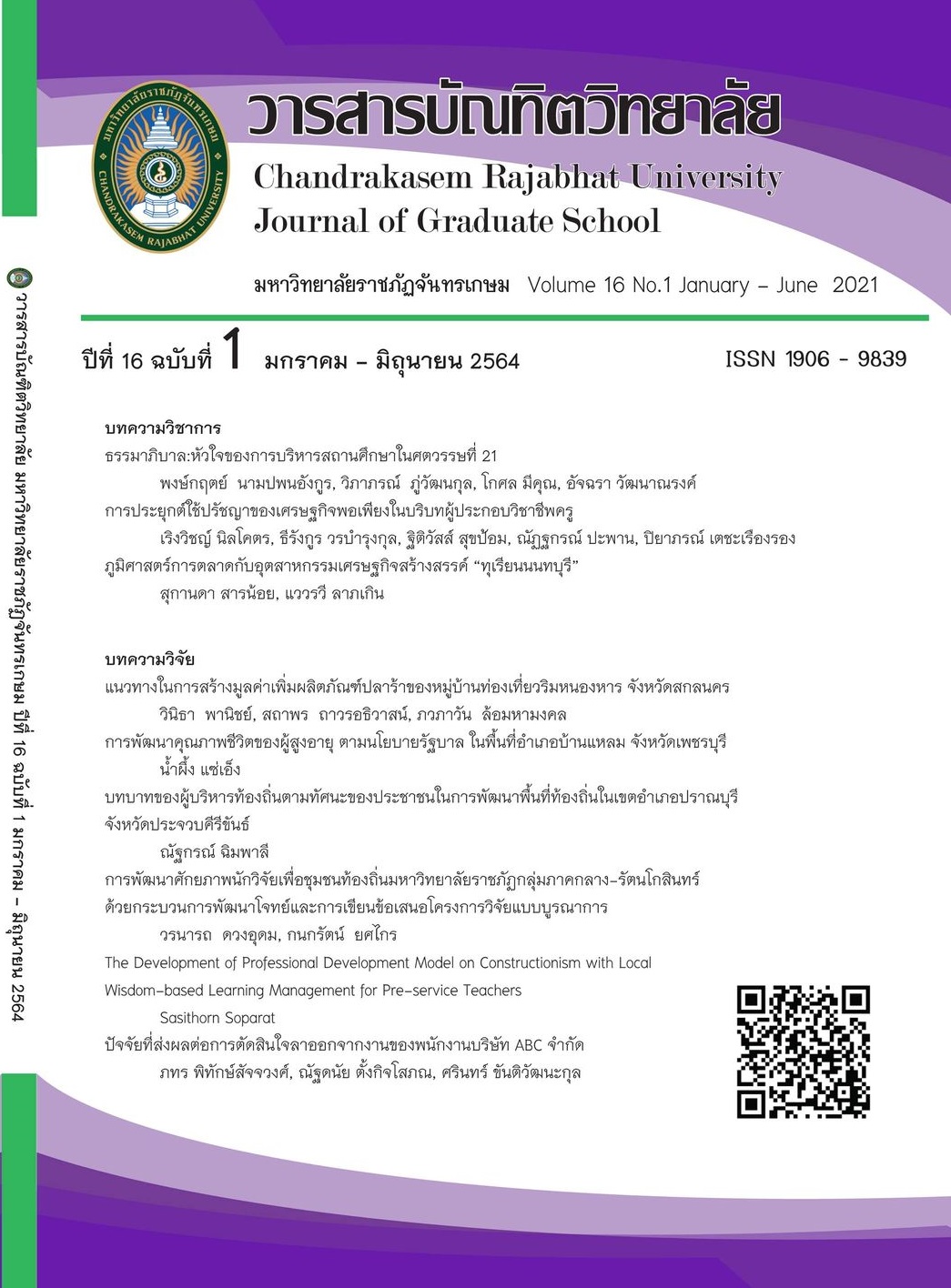The Development of Professional Development Model on Constructionism with Local Wisdom-based Learning Management for Pre-service Teachers
Main Article Content
บทคัดย่อ
The purpose of this research was to develop the professional development model on Constructionism with local wisdom-based learning management for pre-service teachers in Phranakhon Rajabhat University. The samples were 145 samples selected by purposive sampling in following; 24 local wisdom elites, 6 administrators, 115 teachers. The research methodology was research and development. The data collecting tools were the questionnaire surveying the condition of using Thai local wisdom in learning management and the evaluation forms for the professional development model. The basic statistics, percentage and average, were used to analyze the quantitative data and the content analysis was used to analyze the qualitative data.
The research results showed that the professional development model was designed on the conceptual frameworks of (1) the basic knowledge of the model, (2) the objectives of the model, (3) the learning activities, and 4) the learning outcomes and evaluation. There were 5 modules designed as the learning modules in this professional development model, that were; Module 1: Spirituality as Teacher, Module 2: Integrating Local Wisdom and Sufficiency Economy to Learning Activities in Classroom, Module 3: Techniques for Transferring of Knowledge into Classroom, Module 4: Designing the Activities by using Local Wisdom and Sufficiency Economy into Classroom, and Module 5: Developing of Teacher Learning Community. The results of evaluation for the model showed that the average scores were in “agree” in following aspects; 1) the accuracy of principles and rationales of the model was in “agree” levels (𝑥̅ = 4.40), 2) the appropriateness for the context and areas of the model was in “agree” levels (𝑥̅ = 4.41), 3) the possibility to apply the model was in “agree” levels (𝑥̅ = 4.22), and the benefit of the model was in “strongly agree” levels (𝑥̅ = 4.58).
Article Details

อนุญาตภายใต้เงื่อนไข Creative Commons Attribution-NonCommercial-NoDerivatives 4.0 International License.
เอกสารอ้างอิง
Boonapai, P., Niyomsrisomsak, S., & Anaksuk, S. (2014). Model of Science Teachers Development in Primary School: Banmakham School as A Case Study. Journal of Educational Administration Burapha University, (8),104-116. (in Thai)
Bulkley, K.E., & Hicks, J. (2005). Managing community: Professional community in charter schools operated by educational management organizations. Educational Administration Quarterly, 41(2), 306-348.
Calderhead, J. (1989). Reflective Teaching and Teacher Education. Teaching and Teacher Education, 5 (1).
Chatmaneerungcharoen, S. (2020). Enhancing In-service Science Teachers’ Technological Pedagogical Content Knowledge for STEM Education Reflecting Sufficiency Economy. Journal of Rangsit University. 41(1), 138-152. (in Thai)
DuFour R., Eaker, R., Many T., & Mattos, M. (2010). Learning by Doing: A Handbook for Professional Learning Communities at work (3rd ed.). Bloomington, IN: Solution Tree.
Jermtaisong, R. & Thongthew, S. (2013). The Development of an Instructional Model to Enhance Critical Reflective Instructional Design Ability of Student Teachers. Journal of Edcucation Naresuan University, 15(2), 26-33. (in Thai)
Jewchareonsakul S., et al. (2013). The Research Evaluation Report of the Teacher Development Project using Coaching and Mentoring [Online]. Pathumthani Primary Education Service Area Office 2 cooperated with Faculty of Education, Kasetsart University, in the fiscal year of 2013, from: www.edu.ku.ac.th/en/files/20140720113323_edu03.pdf (in Thai)
Netwong, T. (2020). The Using Resource Based Learning of Local Wisdom to Effectiveness Local Wisdom Knowledge Management by ICT of Students in Information Technology Program. Journal of Yala Rajabhat University, 10(1), 40-47. (in Thai)
Office of the National Economic and Social Development Board. (2017). The Twelfth National Economic and Social Development Plan (2017-2021). Bangkok: Office of Agricultural Economics. Ministry of Agriculture and Cooperatives. (in Thai)
Panich, W. (2012). Creation of Learning Method for Students in the 21st Century. Bangkok: Tathata Publication Co.,Ltd. (in Thai)
Richert. A.E. (1990). Teaching teachers to reflect: A consideration of programme structure. Journal of Curriculum Studies, 22(6).
Semprevivo P., (1976). System Analysis: Definition, Process, and Design. Chicago: Science Research Association.
Srisa-ard, B., (2002). Fundamental of Research Methodology. Bangkok: Suveeriyasarn. (in Thai)
Whitten J., and Bentley L. (2007). System Analysis and Design Methods (7th ed.). New York: McGraw-Hill/Irwin.


